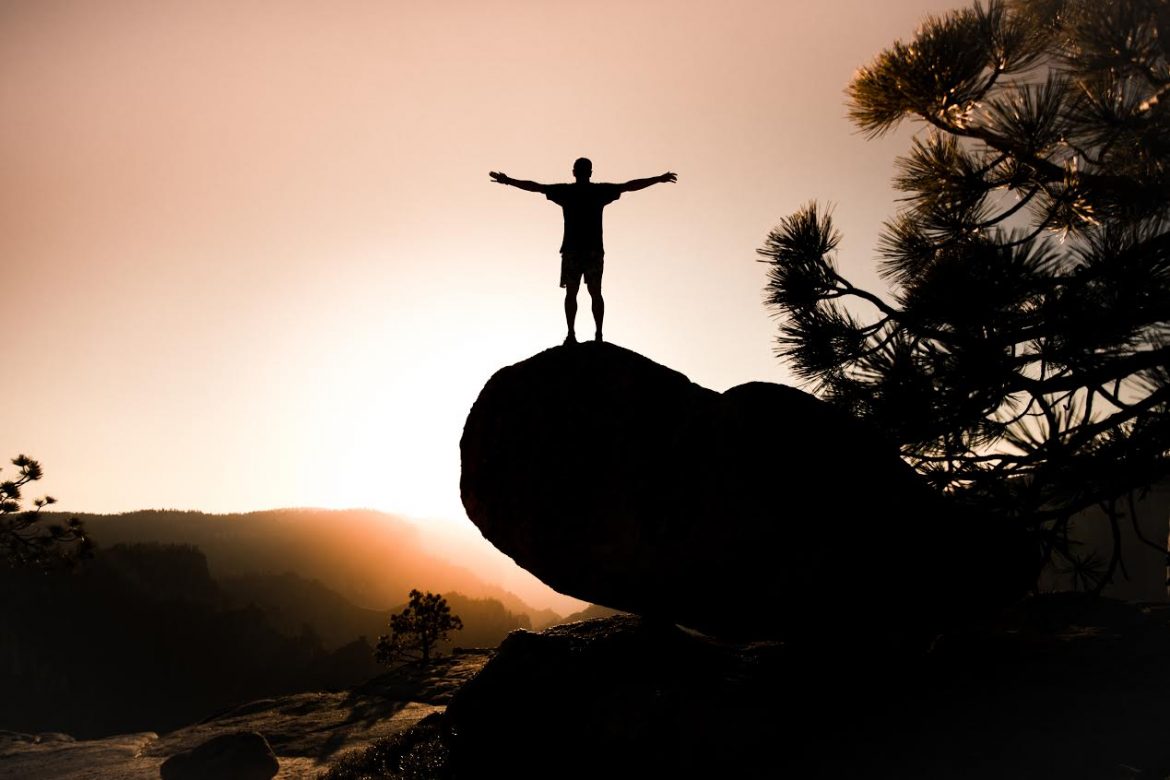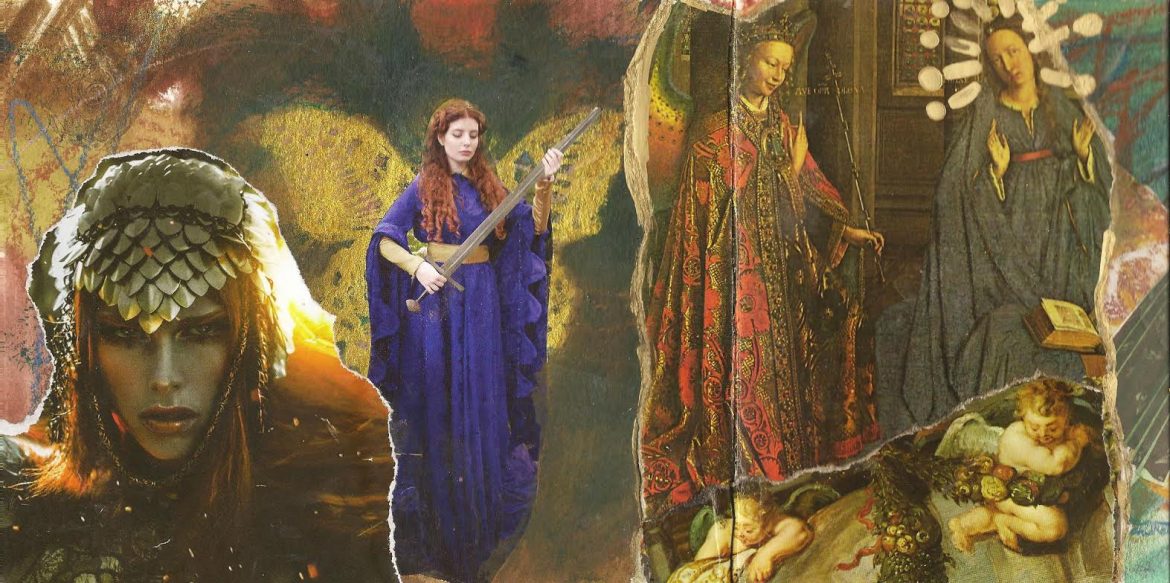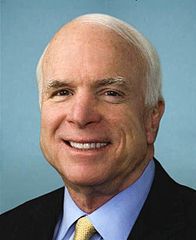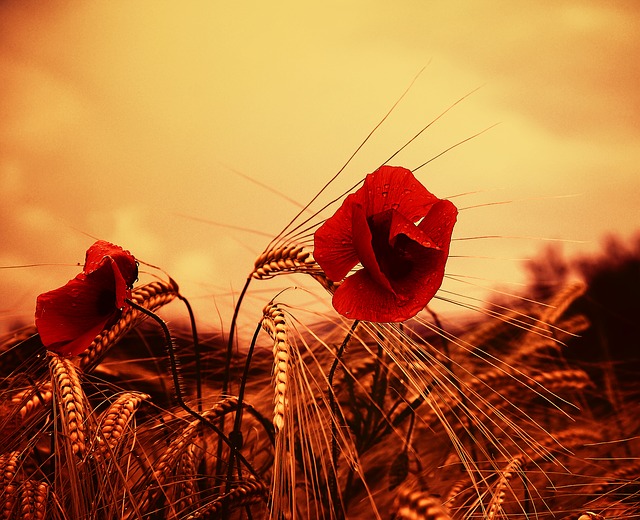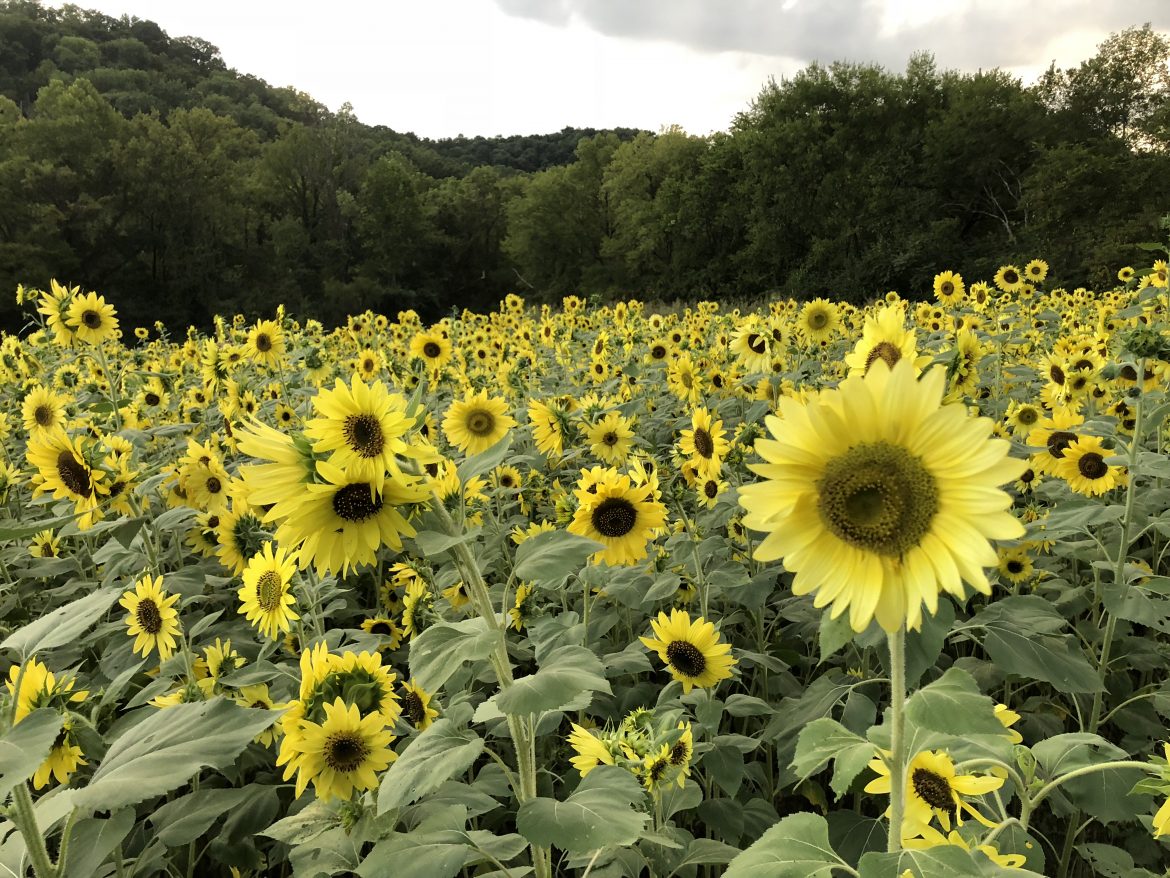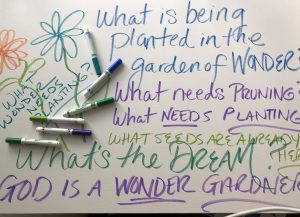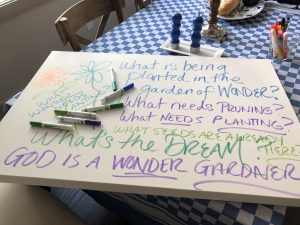One Heart Given Poem by Jenneth Graser —
The inspiration for this poem comes from my thoughts around a spirituality of imperfection. The journeys we take in our lives to discover what it is to be in love with God. We go through places in our spiritual walk where we are too hard on ourselves and try to be perfect, and then we find ourselves also judging others for the wrongs they have done, which separates people. But where do we find God? In a breathing relationship. Being ourselves. Unconditional love. Grace. This poem is my celebration, that God doesn’t expect of me perfection, but just desires my heart. And what does God do with our hearts? They become a feast of grace to share, because this incredible grace is for everyone. With so much fracturing around the world, this grace can heal the cracks and bring people together. This is my prayer through One Heart Given.
One Heart
I have heard it said,
Seek the Lord and his Kingdom
first, and all other things
will be added.
I have seen that some people
desiring to pay for their darkest sins
placed a burden on their
backs and carried it for miles
as penance of the most savage kind.
I have seen people sweat blood
and tears in a Gethsemane of
their own making
and weigh up their sins on a
scale of comparison,
some taking longer than others
to make their way to the cross.
I have seen fingers pointing
and people rushing for the judge’s seat
in a court of law, pronouncing
righteous judgement from their own obvious
point of view.
And I have seen a man in the dirt
with a guitar, singing love songs.
I have observed a woman on her knees
in a pool of perfume spilled.
There were children crying with their
arms raised in oblivious adoration.
The measures used and comparisons
became discarded stones at the feet
of One Man who dared to ask questions,
and write in the sand.
I have seen a person so determined
to be close to God, to stand in
the gap in the wall and lose
all things for the sake of love.
I have seen such a person
give up on ritual, lose all taste
for religious observance.
Read scripture as a love letter,
dance in the rain because it feels good,
sleep under the stars with a loved one,
walk the extra mile for one other
person in need.
Lay aside the performance schedule,
appraisals, ladders that were
meant to be climbed
and choose to pray as friendship,
a walk under leaves, on paths
well worn, close to the bosom
of nature, rough and wild;
and there this person let fall
the expectations of a past
of well-meant intention
but never-attainable practice.
I found this person chose
to sleep at the foot of
the cross and rest on a stone
before a staircase of angels.
I saw the altar built
stone by stone
and the fragrant offering
of one heart given,
never to be taken back,
never regret or second thoughts.
And this heart burned into the
heart of God as a burning bush
with a message to let all people go,
so that everyone, no matter who,
where, or what culture, colour, or
creed, may come, come, come
and find rest that forever changes
the one who is brave enough
to bring nothing of strife or perfection,
but only one heart
on one altar
burned into the forever flame
of God and God’s love.
Love that buried all ladders
at the foot of the cross
so that everyone, everyone
could walk straight into grace
without cost, deed or work achieved –
it was already paid.
A post reflecting on last Monday’s holiday, Labor Day by Jan Blencowe —
Laboring brings up many connotations. Labor is thought of as synonymous with work, and “work” can feel hard and unpleasant. Thus, we have a holiday, Labor Day, which sets us free from our labor for a day of rest. This is an idea that has kinship to the concept of Sabbath and the Years of Jubilee practiced by the Hebrews in Old Testament times.
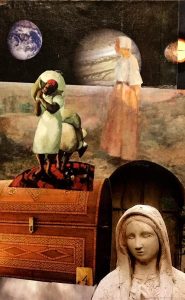 Hard labor is meted out as a punishment. The laboring class is often characterized as oppressed. The extreme or shadow side of labor is slave labor. In paintings, books and film peasants are sometimes shown idealized or romantically cast as laboring in the fields, and working in harmony with nature.
Hard labor is meted out as a punishment. The laboring class is often characterized as oppressed. The extreme or shadow side of labor is slave labor. In paintings, books and film peasants are sometimes shown idealized or romantically cast as laboring in the fields, and working in harmony with nature.
Your “labor” can be your profession or job, and the work you do may feel synonymous with your identity. Childbirth is called labor. Saints and clergy or those in religious life are often thought of as laboring on behalf of the souls of others.
Some things we do we call ” a labor of love” and some things are “laborious”.
As you relax, barbeque or head out to the beach on Labor Day I ask you to consider this: right now, at this moment in your life’s journey, what is your sacred labor? What is the work that you are called to do in the world? What is the nature of the work you are called to do in your inner world?
In Medieval times society was divided into three segments. Those who work were the peasants and serfs. Those who fight were the knights, and those who pray, were the clergy, monks, and nuns.
This interesting way of looking at society and the work we do provides us with an template for evaluating our own sacred work in the world.
Those “who work” could encompass those who create, grow, build, repair, invent, make, weave, sew, write, cook, heal, help, teach, and more. They are active “doers” who contribute to the welfare of others.
Those who fight are motivated by justice and compassion. They are activists, spokespersons, politically involved, journalists, guards and protectors. They are those who move and work on behalf of all of society, giving voice to the voiceless, defending the vulnerable, and protecting the planet.
Those who pray are deeply involved in their own inner worlds as a means of manifesting grace, forgiveness and spiritual growth and evolution in themselves,
and on behalf of the planet and humanity. They are active in the hidden and invisible worlds of spirit. They may be working in the spiritual realm on behalf of peace, justice, liberation, harmony, resurrection, renewal and restoration.
You may discover that you have more than one way of engaging your sacred labor. You may be one who prays, yet your times of introspection and contemplation might compel you to act as “one who fights” like a warrior, knight or advocate for a cause that calls to your heart.
Work and rest are two sides to the same coin. To do your sacred work effectively you must also allow for times of rest. In this regard I find nature to be the supreme teacher.
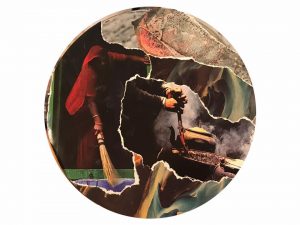 In February, in the northern hemisphere, the earth begins to wake from her dark, ancient dream-sleep. The stirring in the belly begins in February when the sap begins to run in the maples. By the vernal equinox birthing new life has begun. At summer solstice fruit and flower are abundant. August brings Lammas, the little harvest. In September at the equinox the big harvest is ushered in with great celebration and gratitude. The earth has labored through the many months of growing solar energy, to produce plant and animal life on an awe inspiring scale. The end of October brings All Hallows, and rest in the disguise of death. The fallow time of late fall and winter provides the necessary rest, and renewal which is critical to the earth’s ability to labor and produce the following spring.
In February, in the northern hemisphere, the earth begins to wake from her dark, ancient dream-sleep. The stirring in the belly begins in February when the sap begins to run in the maples. By the vernal equinox birthing new life has begun. At summer solstice fruit and flower are abundant. August brings Lammas, the little harvest. In September at the equinox the big harvest is ushered in with great celebration and gratitude. The earth has labored through the many months of growing solar energy, to produce plant and animal life on an awe inspiring scale. The end of October brings All Hallows, and rest in the disguise of death. The fallow time of late fall and winter provides the necessary rest, and renewal which is critical to the earth’s ability to labor and produce the following spring.
Here is where I apply a healthy dose of earth wisdom. You simply can not continue to labor, create, birth and produce without an intentional fallow time of rest. No matter how sacred your work, how strong your calling or vocation you must honor your need for self-care and trust that Spirit will provide for the work to continue through others and other means while you rest.
This Labor Day take some time to rest and consider what your sacred work is and how you will work on your own behalf to create sacred rest so you may continue to follow your calling, serving others and the world in the years to come.
As we continue this months theme, Spirituality of Imperfection, enjoy this beautiful poem by Talitha Fraser —
God
all that I am
anything that I am
is what you made me to be
as much as I am broken,
I am made
as much as I am fallen,
I am raised
as much as I am wounded,
I am restored
as much as I am consumed,
I am made whole
I am drawn towards You, Creator Spirit
the seasons and the cycles
of transformation that are the
source of such wonder and dread
my doing and my undoing
are in You
By April Yamasaki —
Good, better, best,
never let it rest,
until the good is better,
and the better is best!
I don’t know where, why, or how I learned this little rhyme as part of my childhood, but it might explain in part why I always did well in school and why I never liked softball. For at least I knew how to spell and could work at improving, but I was never best, better, or even good at softball, so quickly gave up on it.
Now as an adult, I realize that many things in life run in the opposite direction of my childhood rhyme.
Last year on impulse I bought a beautiful fern, placed it in a bright spot away from direct sunlight as instructed, watered it dutifully not too much and not too little (or so I thought), but one by one the beautiful stalks turned brown, and one by one I removed them, until there’s now just one lone survivor. I’m not sure why my fern has been so unhappy, but it’s definitely gone from good to not-so-good and worse.
On a much more serious level, a friend has a stubborn, terminal cancer resistant to her heavy chemo treatments, and so far unyielding to our prayers for a miraculous recovery. My mother’s health declined in spite of her determined efforts, the excellent medical care she received, and all we tried to do as a family to support her.
I realize now the limits of “good, better, best, never let it rest.” I can’t make everything better by sheer will power and hard work. And rather than wearing myself out on a never-ending treadmill of perfectionism that doesn’t lead anywhere, I’m learning to practice self-care and rest in God’s care.
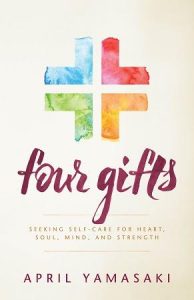 In Four Gifts, I explore self-care for heart, soul, mind, and strength. That means tending to priorities, taking time to nurture my relationship with God and with other people, thinking good thoughts, getting enough sleep, and more—not because I need to do these things perfectly, but practicing them exactly because I’m limited, human, imperfect.
In Four Gifts, I explore self-care for heart, soul, mind, and strength. That means tending to priorities, taking time to nurture my relationship with God and with other people, thinking good thoughts, getting enough sleep, and more—not because I need to do these things perfectly, but practicing them exactly because I’m limited, human, imperfect.
That’s why I think of self-care as part of a spirituality of imperfection—because self-care acknowledges our humanity. Self-care acknowledges our limited energies, our limited time, our limited strength, yet allows us to go on. And when all of my self-care strategies fail, when I fail myself and others, God remains faithful in his care for me.
2 Corinthians 4:16-18 encourages us:
Therefore we do not lose heart. Though outwardly we are wasting away, yet inwardly we are being renewed day by day. For our light and momentary troubles are achieving for us an eternal glory that far outweighs them all. So we fix our eyes not on what is seen, but on what is unseen, since what is seen is temporary, but what is unseen is eternal.
Though outward progress might elude us, though we might seem to be going backwards at times, yet things are not what they seem. Inwardly, we are being renewed by God’s care day by day, and there is eternal glory ahead. So do not lose heart.
by Christine Sine
The death and remembrance of John McCain has taken centerstage for me this week as I suspect it has for many others not just here in the U.S but around the world. I have tremendous respect for this statesman and gentleman whose life and death have much to teach us in our current global climate of disruption, intolerance and at times vitriolic disturbance. He certainly wasn’t perfect, but he was humble enough to admit his mistakes and wise enough to learn from them. That was probably part of his appeal
Here are a few of the lessons I am still learning:
- Speak the truth at all times. One of my frustrations with living in the U.S. is that I find people often, out of a desire for you to like them, will say what they think you want to hear rather than the truth of what they really believe. John McCain, always seemed to speak the truth even when he knew it would alienate him from friends and colleagues.
- Listen to those with whom you disagree. I was amazed to hear that John McCain visited Barak Obama regularly during his presidency for a chat in the Oval Office. They didn’t always agree, or change each other’s minds but it sounds as though they listened with respect to what the other person said and were open to learning and changing based on what they heard.
- Treat people with different viewpoints with respect. To see a past Republican and Democratic president stand up and bear testimony to John McCain’s influence on their lives was very compelling. That he had friends on this calibre on both sides of the political divide was an incredible testimony to his integrity and respect for the equality of all people.
- Forgive and ask forgiveness. John McCain had a temper. He was often opinionated and strong minded, but he was willing to forgive and ask forgiveness when he recognized he was wrong or saw the need for reconciliation with those who had wronged him. That he could return to Vietnam after his incarceration and torture and develop friendships with people in that country is an incredible testimony to this.
- Maintain your passions until the end. John McCain’s passion for bipartisanship was evident until the very end. He orchestrated his own memorial, deliberately drawing together people from both sides of the political divide to bear testimony to his life. I suspect he hoped that these people would also be advocates for bipartisanship in the future.

Parker Palmer: On the Brink of Everything
As I think on the life of John McCain I am once more drawn back to the words of Parker Palmer, looking back on eight decades of life, in his latest book On the Brink of Everything:
For people like me, the notion that old age is a time to dial it down and play it safe is a cop-out. Those of us who are able should be tasing hell on behalf of whatever we care about. (25)
I think John McCain would say Amen to these words and I do too.
As I age I find myself becoming more passionate about injustice, inequality and abandonment of people at the margins. I am more passionate about moving towards my own freedom and wholeness, recognizing more than ever that it is out of embracing my own brokenness and seeing it as an integral part of my life that wholeness comes. At the same time, embracing how my brokenness has contributed to the brokenness of others and seeking forgiveness has enabled them to find that same freedom and wholeness.
Palmer goes on to say:
I no longer ask “What do I want to let go of, and what do I want to give myself to?”
The desire to “hang on” comes from a sense of scarcity and fear. The desire to “give myself” comes from a sense of abundance and generosity. That’s the kind of truth I want to wither into. (27)
What kind of truth do you want to “wither into”? What is the passion of your life, a passion that calls you beyond yourself to your concern for others? These are the questions I would like us all to reflect on as we remember the life and death of John McCain this week. May our lives burn with the same brightness as his did.
Gerald Manley Hopkins is one of my favorite poets and as summer draws to a close here in the Northern Hemisphere it is good to reflect on prayers like this as both a tribute to the season that has past and a preparation for the season that is to come.
HURRAHING IN HARVEST
SUMMER ends now; now, barbarous in beauty, the stooks arise
Around; up above, what wind-walks! what lovely behaviour
Of silk-sack clouds! has wilder, wilful-wavier
Meal-drift moulded ever and melted across skies?
I walk, I lift up, I lift up heart, eyes,
Down all that glory in the heavens to glean our Saviour;
And, éyes, heárt, what looks, what lips yet gave you a
Rapturous love’s greeting of realer, of rounder replies?
And the azurous hung hills are his world-wielding shoulder
Majestic—as a stallion stalwart, very-violet-sweet!
These things, these things were here and but the beholder
Wanting; which two when they once meet,
The heart rears wings bold and bolder
And hurls for him, O half hurls earth for him off under his feet.
–Gerard Manley Hopkins
What Is Your Response?
What have you most enjoyed about the summer season this year?
What are you most looking forward to in the coming season of autumn and harvest, of winter and waiting?
We need Wonder Farmers!
Brad Montague of Kid President Fame leads Wonder Workshops. He is one of my heroes and he is leading one of these workshops here in Nashville in September. This week he offered a chance to win a free ticket to this event if we posted a photograph of wonder on instagram and wrote something about wonder. Brad’s post got me thinking about WONDER…and this is what happened.
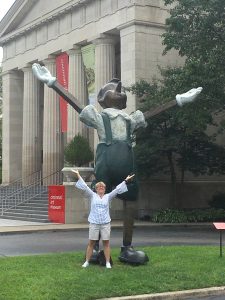
I’m a 7 on the Enneagram, the enthusiast . I tend to be full of WONDER, the expectant, excited, “let’s go on an adventure” kind of wonder. The “let’s blow bubbles, or “let’s create something out of clay,” just for fun kind of wonder. The “WOW what a glorious sunset kind of wonder!” The Mary Poppins what is in your carpet bag kind of wonder!
But not lately. Right now, I’m in an uncomfortable place. The kind of place that has me doing a lot of Wondering … wondering if what i do really matters to anyone. Wondering if it’s time to do something different. Wondering what i am supposed be doing that I’m not currently doing. Wondering what is next. Wondering about the craziness of our world and it’s lack of love and justice. Wondering how long i will be wondering. What i know about myself is that when i get in this place of wondering, I tend to panic. I tend to run ahead of God and I can totally lose sight of all the good things around me. I shut down. I stop being me. I lose hope for myself and others. The circle becomes dark rather than filled with multiple rays of color. And I really lose all sense of true wonder and all it’s glorious goodness. Which also means I miss out on the goodness and wonder of God.
I know, I know…
There are seasons for everything
There are times of drought
And times of abundance
There are times of great creativity and time when things need to lay fallow in order for new things to have better soil in which to grow.
But if I’m honest, I’m in real need of some Wonder Farmers in my life.
I’m in need of some Wonder Farmers who have the patience and hope to help me grow again. I need people like Brad Montague and Christine Sine and Artist Scott Erickson who inspire me and encourage me to keep seeking WONDER in the middle of the worry wondering!
Farmers have lots of patience. They have time to pause and time to wait.
They know about the seasons.
They watch for signs and pay attention to the weather. They aren’t afraid of the storms.
They plant seeds, pull out the weeds and make sure there is extra water when the rains don’t come.
These Wonder Farmers know that pruning hurts but the fruit that grows is better after the pruning!
Where are you today? Are you Worry Wondering? or Are you filled with Wonder?
And maybe we need WONDER Gardeners as well as WONDER Farmers! The Wonder Gardener takes time for each plant and they plan out what they want to grow. Gardeners expect that things will grow well but they don’t give up hope when they don’t. A Gardner takes time to water some plants more than others, and chooses certain flowers for their color and others for their scent. They know when to fertilize and when to replant. They grow extras. Gardeners are generous with their produce and they like giving away the fruits of their labor to share with neighbors and friends. And this reminds me that God not only is THE Wonder Farmer, God is THE Wonder Gardener too!
Are you a Wonder Farmer? or a Wonder Gardener? Could you become one? What would that look like in your world?
Who are your Wonder Farmers? Who are your WONDER GARDENERS? Who are the people in your life that bring you hope? The people who inspire you? The people who encourage you?
Take some time to think about this. Take some time to be grateful for them today. Maybe you could text them or email them or even send a card and let them know they have value and they matter!
Even Wonder Farmers and Wonder Gardeners need encouragement!
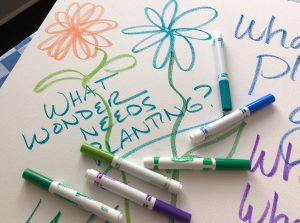
How are you doing? Are you Wondering or Filled with Wonder?
What needs to be planted in your Garden of Wonder?
What is already being planted? What seeds are already there?
What signs of wonder can you already identify? What do you notice?
What needs pruning? What Needs Cultivating? What needs more water?
What WONDER produce might need picking and sharing with others?
Take time to write down the things that are causing you to worry wondering rather than wonder in curiosity. Give those to Jesus!
Are you letting Jesus be your Wonder Gardener?
Go to a garden. Walk around in it. Dig in the dirt. Plant something. Talk to God about all the things you are wondering and worrying about.
Allow God to show you what is already growing. Allow Jesus to fill you up with wonder again as you notice the flowers, the vegetables, the plants. Ask Jesus to be your WONDER GARDENER and your WONDER FARMER as you watch the bees and bugs and butterflies. As you see the creativity of creation and the beauty even in a blade of grass!
And don’t be afraid of the season of wondering…know that God the Gardener and Wonder Farmer is at work in the wondering too!
As an Amazon Associate, I receive a small amount for purchases made through appropriate links.
Thank you for supporting Godspace in this way.
When referencing or quoting Godspace Light, please be sure to include the Author (Christine Sine unless otherwise noted), the Title of the article or resource, the Source link where appropriate, and ©Godspacelight.com. Thank you!

